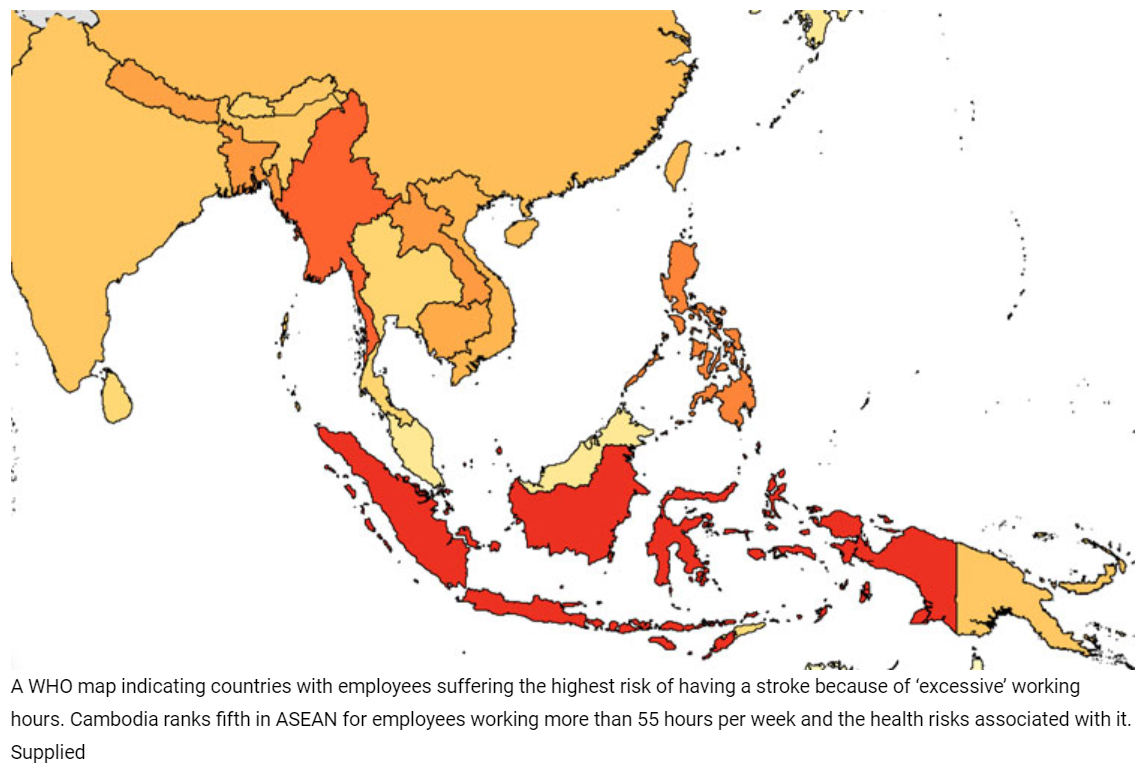Cambodia fifth in ASEAN for ‘excessive’ working hours
Southeast Asia has been identified by the World Health Organization (WHO) as the region with the highest risk of heart disease and strokes associated with working long hours. The report, analysing the impact of long working hours on health and life, cited that 11.7 percent of workers in the region work more than 55 hours per week.
Cambodia ranked fifth highest in ASEAN with 11.5 percent of the labour force working “excessive” hours. Indonesians ranked first with a staggering 20 percent of the workers toiling more than 55 hours weekly, according to data sourced from 1970 to 2018.
By comparison, Laos ranked fourth with 13.1 percent, Vietnam ranked sixth with 10.4 percent and Thailand ranked sixth with 10.4 percent. Singaporean workers had the lowest risk at only 2.8 percent.
“Of all regions in 2016, Southeast Asia had by far the largest number of deaths caused by ischaemic heart disease [heart problems caused by narrowed arteries] attributable to long working hours, at 160,000 deaths. In relative terms, Southeast Asia still had the largest death rate at 11.4 deaths per 100,000 people. Over 2000-2016, the number of deaths increased in all regions, except Europe,” the WHO said.
Southeast Asia also led the world in the most strokes attributed to long working hours with 11.3 deaths per 100,000 people – the equivalent of 159,000 deaths over that period.
The global average for people working more than 55 hours is about 9 percent – 479 million people. The data compiled excluded individuals below the age of 15 as well as unpaid domestic workers.
Risks increased as workers got older, with men “overrepresented among those working 55 hours or more a week”.
A total of 72 percent of work-related diseases were endured by males, particularly those living in the Western Pacific and Southeast Asia. Most of the deaths recorded were among people dying aged 60 to 79. However, those who worked 55 hours or more tended to die between the ages of 45 and 74.
“With working long hours now known to be responsible for one-third of the total estimated work-related burden of disease, it is established as the risk factor with the largest occupational disease burden. This [finding] shifts thinking towards a relatively new and more psychosocial occupational risk factor to human health,” the report said.
Globally, the study found that working 55 hours or more per week is associated with a 35 percent higher risk of stroke and a 17 percent risk of dying from ischaemic heart disease, compared with working 35 to 40 hours, as recommended by the WHO.
The WHO also warned that the pandemic has accelerated developments that could increase the trend towards increased working time.
“The COVID-19 pandemic has significantly changed the way people work. Tele-working has become the norm in many industries, often blurring the boundaries between work and home. In addition, many businesses have been forced to scale back or shut down operations to save money and people who are still on the payroll end up working longer hours. No job is worth the risk of stroke or heart disease. Governments, employers and workers need to work together to agree on limits to protect the health of workers,” said Tedros Adhanom Ghebreyesus, WHO’s director-general.
The WHO recommends that governments introduce and implement laws that ban mandatory overtime and ensure maximum limits to working hours. It also called on employees to share working hours so as not to exceed 55 or more per week.
In Southeast Asia, average life expectancy for women is 73.1 and for men it is 69.9. Globally, it is 70.8 for men and 75.9 for women.
Source: https://www.khmertimeskh.com/50858255/cambodia-fifth-in-asean-for-excessive-working-hours/


 English
English




